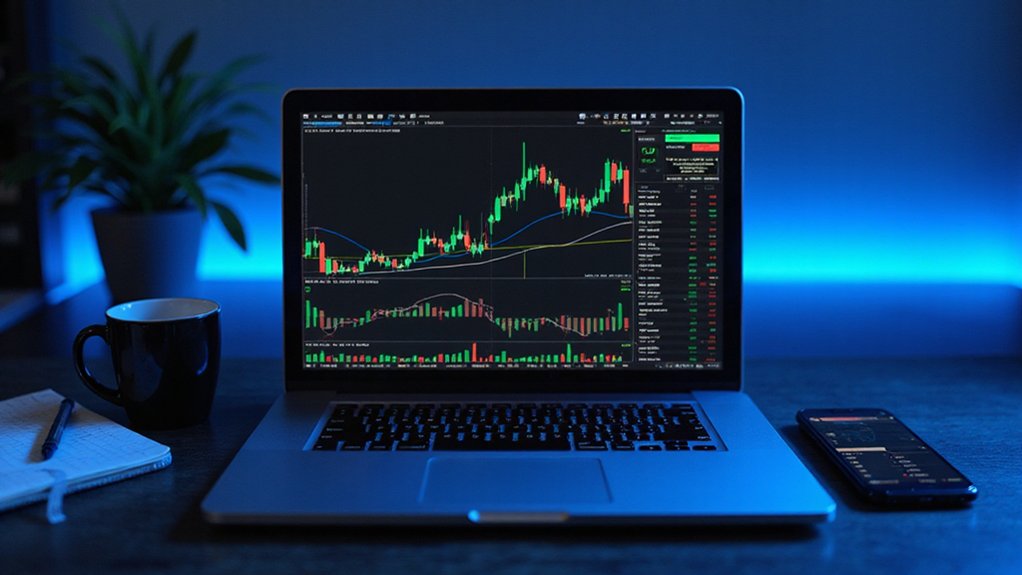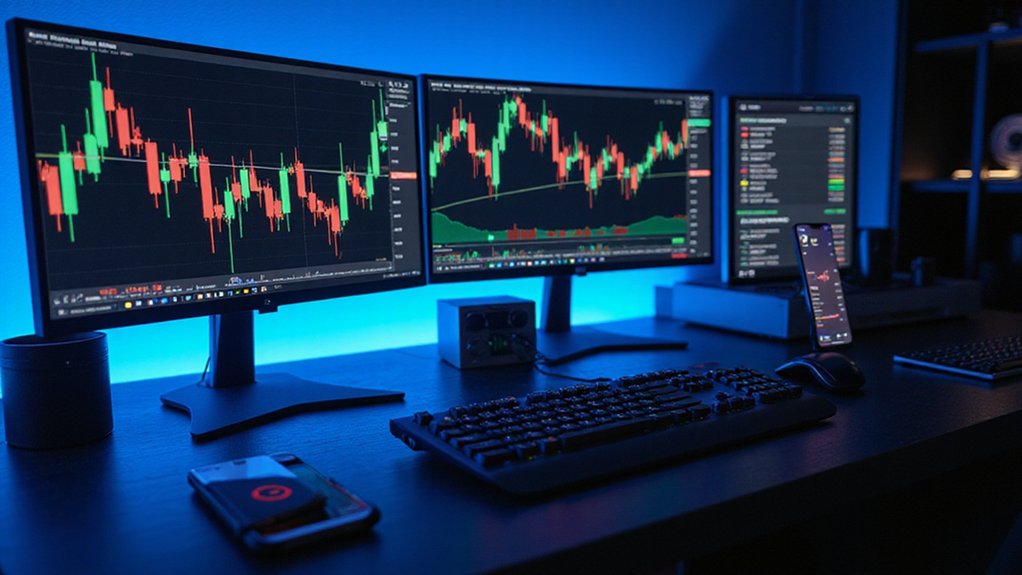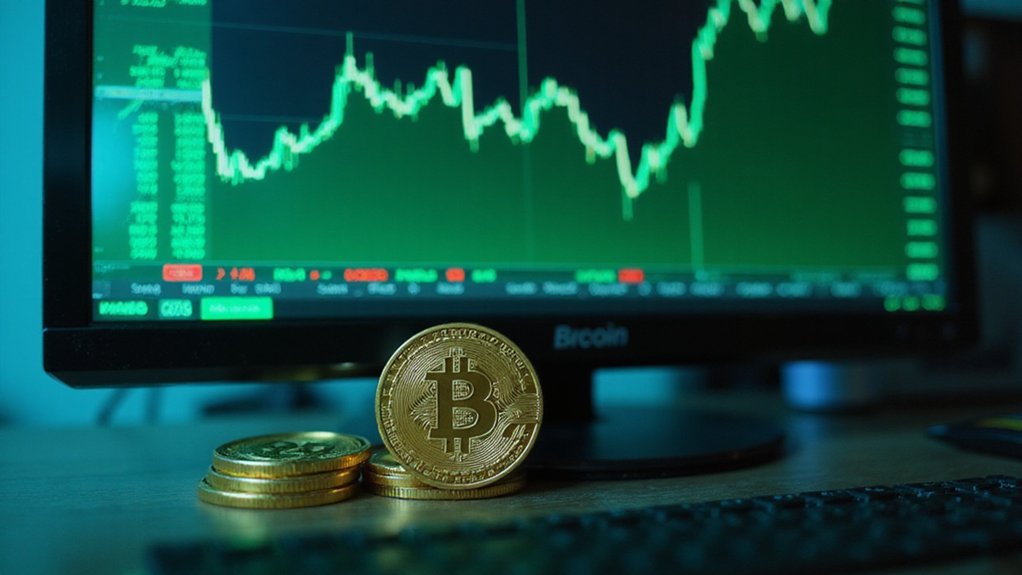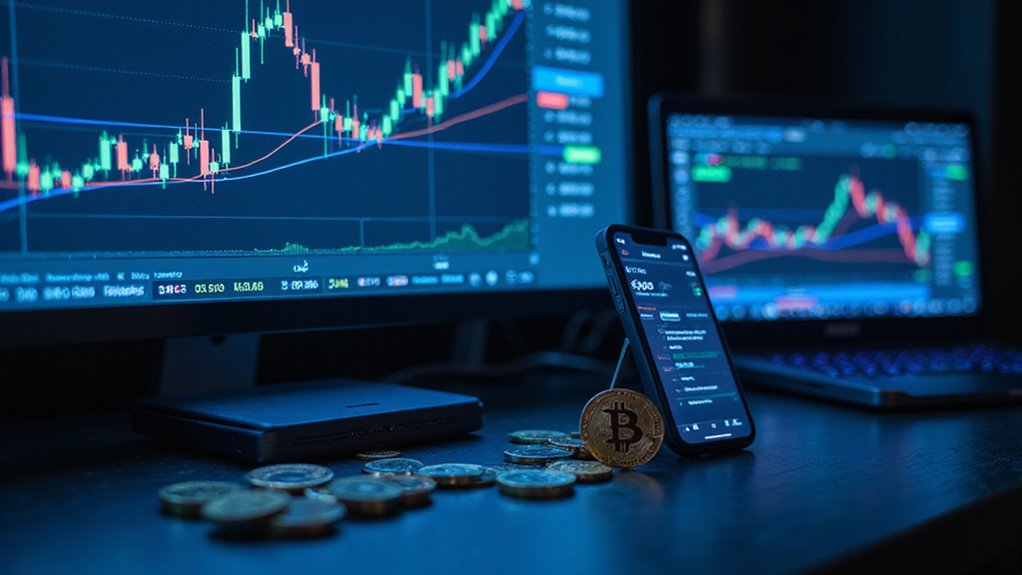LMAX Digital operates as a regulated institutional cryptocurrency exchange, combining traditional financial market architecture with digital asset trading. Catering exclusively to banks, funds, and asset managers, it employs a central limit order book model with ultra-low latency execution. The platform trades major cryptocurrencies like Bitcoin and Ethereum while maintaining institutional-grade security through multi-signature cold storage and robust AML/KYC practices. Its impressive 100% uptime record exemplifies why serious capital increasingly gravitates toward regulated crypto venues.

The LMAX Digital Cryptocurrency Exchange stands as a rather distinctive player in the often tumultuous crypto trading landscape, offering institutional-grade services that bear little resemblance to the retail-focused platforms dominating headlines.
Operated by LMAX Group and regulated by the Gibraltar Financial Services Commission, this exchange leverages proven technology infrastructure to deliver what institutional investors actually require: reliable execution, regulatory compliance, and robust security—concepts seemingly revolutionary in an industry where exchange failures have become distressingly commonplace.
Regulatory oversight meets technological rigor—a refreshing anomaly in crypto’s Wild West landscape.
At its core, LMAX Digital employs the central limit order book model, a structure that sophisticated market participants will recognize from traditional financial exchanges.
This architecture enables precise and consistent execution through ultra-low latency systems, a welcome reprieve from the opacity plaguing many cryptocurrency platforms.
Unlike innovative hybrid exchanges such as Bullish that combine CLOB with AMM to minimize slippage, LMAX Digital focuses exclusively on the traditional order book model.
The exchange streams real-time market data to leading indices and analytics platforms, establishing itself as a primary price discovery venue for major cryptocurrencies—a role that carries significant weight in an asset class still struggling for mainstream legitimacy.
The platform’s cryptocurrency offerings include the usual suspects—Bitcoin, Ethereum, Litecoin, Bitcoin Cash, and XRP—alongside emerging players like Solana, Chainlink, and Uniswap.
What distinguishes LMAX Digital, however, isn’t merely what they trade but how they safeguard these assets.
The exchange provides complete transparency in all of its operations, ensuring institutional clients can trade with confidence in a market often criticized for its opacity.
The implementation of tiered offline hardware wallets and multi-signature cold storage represents an institutional approach to security that retail exchanges might study with profit.
The exchange boasts an impressive 100% uptime record, reflecting its commitment to reliability and continuous service availability for institutional traders.
LMAX Digital caters exclusively to institutions—banks, funds, corporates, brokerages, and asset managers—creating a trading environment markedly different from retail-dominated exchanges.
This institutional focus enables deeper liquidity pools and more efficient price discovery, critical factors for participants deploying significant capital.
The exchange operates under similar principles to LMAX Group’s FCA-regulated Multilateral Trading Facility, implementing robust AML/KYC practices that would make some crypto libertarians apoplectic.
In an industry where regulatory compliance is increasingly non-negotiable, LMAX Digital’s institutional-grade oversight represents not merely a competitive advantage but perhaps the future direction of cryptocurrency trading itself.
Frequently Asked Questions
What Security Measures Does LMAX Digital Implement to Protect Assets?
LMAX Digital employs multiple tiers of asset protection through cold and vault storage systems, utilizing multi-signature wallets dispersed across geographically separate locations.
Their infrastructure includes thorough offline wallet systems, proven technology borrowed from LMAX Exchange’s ecosystem, and rigorous cybersecurity measures.
The platform maintains high uptime with microsecond order timestamping while enforcing strict compliance protocols.
Their custody solution incorporates hot/warm/cold wallets with multi-signature requirements and a “multiple eyes process” for withdrawals—essentially a sophisticated digital fortress with redundant safeguards.
How Does LMAX Digital Handle Network Congestion During Peak Trading?
LMAX Digital tackles network congestion with its proprietary infrastructure designed explicitly for high-throughput scenarios.
During peak trading, their Azul Zing JVM technology minimizes garbage collection pauses, keeping latency consistently below 3ms even under stress.
Their system architecture prevents performance cliffs by maintaining throughput below critical thresholds, while thorough back-pressure mitigation strategies guarantee packet delivery remains intact.
Rather than merely reacting to congestion, their entire ecosystem anticipates it—a rather innovative departure from exchanges that buckle precisely when stability matters most.
What Fees Does LMAX Digital Charge for Cryptocurrency Transactions?
LMAX Digital’s fee structure remains somewhat opaque in public documentation—a curious omission for an institutional exchange of its stature.
While specific cryptocurrency transaction fees aren’t publicly disclosed, institutional clients likely encounter tiered pricing based on trading volumes.
What is known: data access commands a premium ($500 monthly through CoinAPI), inactive institutional traders face a $1,000 per port monthly cross-connect fee, and high-volume traders (exceeding $5M monthly) may negotiate preferential terms—standard financial gatekeeping in institutional crypto.
Does LMAX Digital Offer Staking or Yield-Earning Opportunities?
LMAX Digital, somewhat surprisingly for a platform of its institutional caliber, does not currently offer staking or yield-earning opportunities to its users.
The exchange maintains a strictly spot-trading focus, deliberately separating itself from the yield-chasing zeitgeist that has swept through retail crypto platforms.
This strategic positioning aligns with its institutional mandate and regulatory framework, which prioritizes secure trading and custody services rather than the more complex (and potentially problematic) passive income mechanisms.
How Does LMAX Digital Ensure Regulatory Compliance Across Different Jurisdictions?
LMAX Digital navigates the regulatory labyrinth by operating under the Gibraltar Financial Services Commission’s DLT framework, which provides a compliant foundation applicable across jurisdictions.
The exchange implements a single public rulebook for all participants while maintaining rigorous AML/KYC protocols consistent with institutional standards.
Their Compliance and Regulatory Committee actively monitors adherence to various regulatory requirements, effectively transplanting the proven compliance infrastructure from their FX business to cryptocurrency markets—no small feat in today’s fragmented regulatory landscape.









